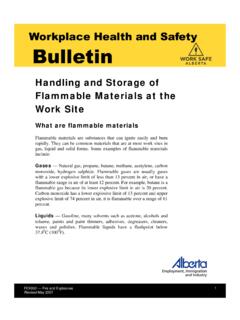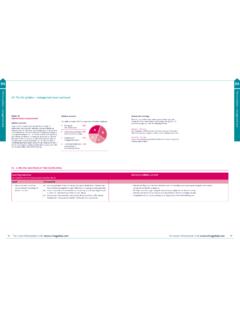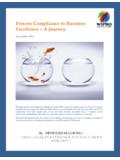Transcription of Characteristics of an Effective Team
1 Characteristics of an Effective Team Definition of a Team y A team is a highly communicative group of people with different backgrounds, skills and abilities with a common purpose who are working together to achieve clearly identified goals. Characteristics of an Effective Team y Throughout our research via web and written publications, numerous Characteristics /traits emerged on what makes up an Effective team. On the next few slide are the most common traits that our team felt were critical in maintaining/building an Effective team.
2 Y These common Characteristics include: Trust, Conflict, Commitment and Accountability. Trust y The true foundation of successful companies, families and marriages is trust. Because trust enables people to communicate to solve problems.. Stephen R. Covey Author of The Seven Habits of Highly Successful People . Trust y Team member must trust each other. y No Trust = No Effective Team. y Trust is the confidence among team members that their peers' intentions are good and that they can be totally open and vulnerable within the group .
3 Some vulnerabilities include: Skills and Training deficiencies, interpersonal, mistakes and always requesting help from other teammates. y Trust throughout your team environment can actually help eliminate potential problems. Skills and Abilities Trust Trusting Teams Untrusting Teams Admit weaknesses and mistakes Conceal their weaknesses and mistakes from one another Ask for help Hesitate to ask for help or provide constructive feedback Accept questions and input about their areas of Hesitate to offer help outside their own areas of responsibilities responsibility Give other members the benefit of the doubt Jump to conclusions about the intentions and aptitudes of others Take risks in offering feedback and assistance Fail to
4 Recognize and tap into one another's skills and abilities Appreciate one another's skills and experiences Waste time and energy managing their behaviours for effect Offer and accept apologies without hesitation Hold Grudges Look forward to meetings and other opportunities Dread meetings and find reasons to avoid to work as a group spending time together. Constructive Conflict y Keeping conflict constructive helps to build decision commitment, and therefore facilitates implementation . Michael Roberto Author of Why Great Leaders don't take Yes for an Answer.
5 Constructive Conflict y All great relationships that last over time, require productive conflict in order to grow. y Unfortunately most people like to avoid conflict as it usually tends to end up being destructive and personal. y True productive ideological conflicts produce the best possible solutions to problems within the shortest period of time. y People who avoid conflict in the name of efficiency, actually make the team inefficient because critical issues do not get resolved and they are revisited over and over again.
6 Constructive Conflict Teams that engage in conflict Teams that fear conflict Have lively, interesting meetings Have boring meetings Extract and exploit the ideas of all team Create environments where back . members channel politics and personal attacks thrive Solve real problems quickly Ignore controversial topics that are critical to team success Minimize politics Fail to tap into all the opinions and perspectives of team members Put critical topics on the table for Waste time an energy with posturing discussion and interpersonal risk management Commitment y Individual commitment to a group effort that is what makes a team work, a company work, a society work, a civilization work.
7 Vince Lombardi Former NFL Coach for the Green Bay Packers Commitment y Being a committed team member is a function of 2 things: Clarity and buy in. Each team member has a complete understanding of the goals/objectives of the team and total buy in on how to achieve the team goals/objectives. y The 2 greatest causes of the lack of commitment are the desire for consensus and the need for certainty. y Consensus y Certainty Commitment Committed Teams Uncommitted Teams Create clarity around direction and Create doubt among the teams priorities direction and priorities Aligns the entire team around common Breeds lack of confidence and fear of objectives failure Develops an ability to learn from Revisits same issues over and over mistakes again without any decisions being made Moves forward without hesitation Changes directions without hesitation or guilt Accountability y Accountability breeds response
8 Ability.. Stephen R. Covey y He that is good for making excuses is seldom good for anything else. Benjamin Franklin Accountability y In the context of teamwork, it refers to knowing your role within the team and the roles and responsibilities of your team members and to call them out when their performance or behaviours are detrimental to the team. y This is easier said than done as close teams usually spawn friendships and calling them out may jeopardizing these personal relationships. y Ironically, this can cause the relationship to deteriorate faster as team members begin to resent one another for not pulling their weight.
9 Accountability Teams who holds one another Teams that avoid accountability accountable Establishes respect among the team as Creates resentment around members they are all held to the same standards who have different standards or performance Ensures that all team members Misses deadlines contribute to the team Feel pressure to improve when Encourages mediocrity performance is slipping Identify potential problems quickly by Creates Bottlenecks in day 2 day questioning one another's approaches processes without hesitation Places an undue burden on the team leader as the sole source of discipline Conclusion Lean Production in Healthcare What is Lean?
10 Y James P. Womack first coined the term Lean Manufacturing in his 1990 book The Machine that Changed the World . y Womack documented Toyota Motor Companies Toyota Production System . y Beginning with Henry Fords basic production principles but faced with HR, space and capital restraints Toyota had to develop work methods to produce quality vehicles at a low cost. y The methods Toyota developed have evolved into Lean Management . Lean Production or Lean Thinking . y The principle goal of Lean is to eliminate waste, reduce unnecessary handling, eliminate unnecessary steps and wait times and reduce inventory.














